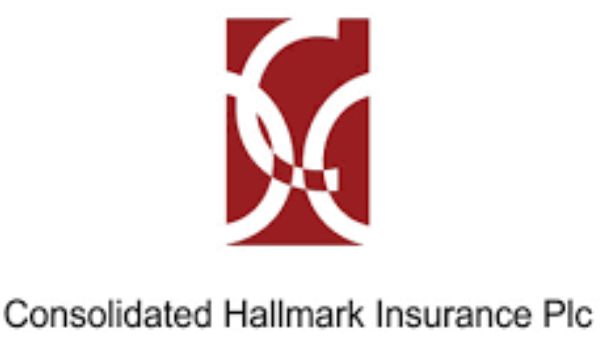E-Financial
Consolidated Hallmark Insurance Bullish on Future Performance

Mr. Obinna Ekezie, the Chairman, Board of Directors of Consolidated Hallmark Insurance (CHI) Plc, has said the years ahead are indeed bright for the company and its stakeholders because the company would leverage on its continued expansion as a one -stop insurance and other financial services provider through its subsidiaries.

Okezie, who spoke at the annual general meeting (AGM) held Lagos, recently, said CHI Plc would not relent in boosting working capital while awaiting developments in the recapitalisation journey of the insurance industry.
Ekezie said that the local insurance operating environment was characterised by activities of operators geared towards meeting the recapitalisation thresholds set by the industry regulator The National Insurance Commission (NAICOM) the previous year.
According to him, He said that the first phase of the recapitalisation exercise required that operators meet a minimum of 50 per cent of the new requirement by December, 2020 and the balance to be met in September, 2021.
Although the recapitalization exercise is put on hold due to court action, Ekezie said CHI Plc proactively continued with the raising of additional capital, with a successful Rights Issue where 2,032,500,000 shares were offered and fully subscribed notwithstanding the limitations imposed by the pandemic.
“We thank you for your immense support which culminated in the success of the capital raise and shall not relent in taking further steps to boost our working capital as we await further developments on recapitalisation from the industry regulator.
“The next phase of our fund drive shall be conveyed to you, distinguished shareholders, as we take definite steps towards meeting the N10 billion threshold, subject to further developments in the industry,” he said.
Speaking on the performance of the company for the 2020 financial year ended December 30, 2020, Ekezie said that amid challenges in the global and local economy owing to the COVID-19 pandemic among others, the company recorded significant growth in key performance indices.
“With the benefit of hindsight, we are quite optimistic that future operating results would be significantly improved upon as the Macro Economic Environment and Global Outlook presents brighter pictures in the years ahead.
“With business operations now getting back fully to normal and the effects of the global pandemic gradually waning, especially in our local operating environment, we are quite hopeful of further improvement in performance,” he stated.
The chairman said that CHI Plc posted an all-time high gross premium written of N9.77 billion, showing a 12 per cent growth when compared with the N8.69 billion in 2019. Profit after tax increased to N677.98 million from N600.31 million in 2019. Total assets increased by 22 per cent, growing to N14.31 billion from N11.74 billion ached in 2019.
Based on the performance, the directors recommended a dividend of N216.8 million, which translated into two kobo per share.
On his part, Mr. Eddie Efekoha, the Group Managing Director/Chief Executive Officer, CHI Plc, said that the company had achieved 50.7 per cent of the mandated N10 billion thresholds by raising capital to N5.06 billion in November 2020.
“Our successful Rights Issue thus sent a signal of our commitment towards meeting the new requirement, as we achieved 50.7 per cent of the mandated N10 billion thresholds by raising our capital to N5.065billion in November 2020.
“Ahead of the earlier deadline of December 31, 2020 for 50 per cent as a general business insurer.
“Your Company shareholders fund stood at N8.03billion as at end of December, 2020.
“Although the industry recapitalisation programme is currently on hold, NAICOM has continued to adopt other measures and initiatives for the effective regulation of the industry.
“Some of which include the automation of the Annual Returns filing and licensing of more insurance companies to stimulate competition in the market.
“They have also allowed existing operators to establish micro-insurance business as a department: a development that is intended to drive up financial inclusion and increase insurance penetration in Nigeria,” he added.
Looking ahead, Efekoha foresaw an increasing positive contribution of the subsidiaries – Grand Treasurers Limited, Hallmark HMO, and recently CHI Micro-Insurance to the overall results of the group.
E-Financial
AfDB Mobilizes $2.2Bn to Support Nigeria’s Agriculture

African Development Bank (AfDB) is mobilising $2.2 billion to develop agricultural processing zones in 28 states in Nigeria to boost food security and create jobs, Akinwumi Adesina, the bank’s president said on Tuesday.

Adesina was speaking in northern Kaduna state while launching the first phase of the initiative that is targeting five states. This phase is being bankrolled by more than $500 million that was first announced in 2022.
The AfDB head said the funding needs for the second phase would be presented to the AfDB board shortly for approval.
“We have been able, I would like to say, to mobilize $2.2 billion of investment interest to support the second phase across Nigeria,” he said during the ceremony in Kaduna.
Adesina said besides the AfDB, Arab Bank for Economic Development, Africa Import-Export Bank, agri-investment fintech Sahara Farms and French and U.S. institutions were among institutions that would help raise the $2.2 billion.
The agro-processing zones aim to create facilities to process agricultural produce closer to farmers, which will reduce post-harvest losses and strengthen value chains from farms to market.
Last year, Nigeria spent $4.7 billion importing food, the AfDB said, a trend authorities also hope to reverse with more investment in the farming sector.
E-Financial
Court Delays $81.5Bn Tax Evasion Case against Binance

Nigerian authorities have postponed legal proceedings against Binance as tensions persist over the crypto exchange’s role in the country’s economic troubles.

According to a recent report, a court in Nigeria has pushed back the tax evasion case to April 30.
The delay gives the Federal Inland Revenue Service (FIRS) more time to respond to Binance’s request to cancel a previous court order that allowed legal documents to be served to the company via email.
The FIRS initially filed the lawsuit in February, claiming Binance owes the country a whopping $2 billion in taxes along with an additional $79.5 billion in economic damages.
Related court filings reveal that the agency is pushing for the exchange to pay corporate income taxes for the years 2022 and 2023.
On top of that, FIRS has demanded a 10% annual penalty on the unpaid taxes and nearly 27% interest on the outstanding amounts.
The agency has argued that Binance’s level of business activity qualifies as a “significant economic presence” in Nigeria, thereby making it liable for taxation under local law.
Binance, however, has challenged the court’s earlier decision to allow the order to be served via email.
According to Chukwuka Ikwuazom, Binance’s attorney, the order should be annulled, as Binance is registered in the Cayman Islands, has no physical office in Nigeria, and was served without proper court authorisation for cross-border delivery.
Since expanding its services to Nigeria on October 24, 2019, with the addition of Naira, Binance’s journey in the West African country has been marred with regulatory pushback.
Things came to a head in February 2024 when two Binance executives, Tigran Gambaryan, a US citizen, and Nadeem Anjarwalla, a British-Kenyan national, were unexpectedly detained by Nigerian authorities.
The executives had travelled to Abuja for what was supposed to be a series of meetings with government officials to address concerns around Binance’s local operations.
Instead, they were arrested and charged with tax evasion and money laundering.
The situation took a dramatic turn when Anjarwalla escaped custody in March and fled the country, reportedly making his way to Kenya, where he remains at large.
Gambaryan, however, stayed behind bars for months.
As previously covered on Invezz, reports soon started to surface that Gambaryan was suffering from pneumonia, malaria, and a herniated spinal disc, all while allegedly being denied proper medical attention.
His detention caught the attention of US lawmakers, which even led Representative Rich McCormick to introduce a resolution in July 2024 that classified his arrest as a hostage situation.
By October, the Nigerian government dropped the money laundering charges against Gambaryan, leading to his release on October 23, 2024.
He returned to the US the same month, bringing an end to a nearly seven-month-long detention.
In between, Binance officially halted all naira-related services and exited the Nigerian market in March 2024.
E-Financial
Moniepoint Leads the Charge for Financial Inclusion @PAFON 2.0

Moniepoint Microfinance Bank, a subsidiary of Moniepoint Inc., Africa’s leading digital financial services provider and the Continent’s fastest growing financial institution, is set to demonstrate its continuous innovations towards advancing financial inclusion in Nigeria.

The Federal Government recently hailed the contributions and remarkable achievements of Africa’s fastest-growing financial institution, Moniepoint Inc in the financial technology sector, its commitment to advancing financial inclusion, and its ongoing collaborations with law enforcement agencies to combat financial fraud.
Mr. Babatunde Olofin, the managing director, Moniepoint Microfinance Bank, has been announced among industry leaders to speak at the Payments Forum Nigeria (PAFON).
The Forum scheduled to hold on Thursday, April 10, 2025 at the Function Room 1, Oriental Hotel, Lekki Road, Lagos, has as the theme: “Bridging the Customer Experience Gap for Financial Inclusion Using AI”.
Babatunde Olofin is a digital innovator, entrepreneur and experienced banker; with two decades experience in digital financial product management within the telecoms, banking and fintech space.
Under his leadership, Moniepoint MFB is focused on providing comprehensive banking services that support the financial well-being of individuals and businesses across Nigeria.
Tunde is a well sought after conference speaker for the clarity and depth of thought he brings to issues around the transformation of Nigeria’s digital banking landscape.
He will join other speakers, namely, Ebehijie Momoh (Mrs), managing director and chief executive officer, AfriGoPay Financial Services Ltd., Uche Uzoebo (Mrs), managing director and chief executive officer, Shared Agent Network Expansion Facilities (SANEF) Limited and Mrs. Chika Nwosu, managing director and chief executive officer of PalmPay (Nigeria). and Fasasi Atanda, national president of the Association of Mobile Money and Bank Agents in Nigeria (AMMBAN).
Others include, Happiness Obioha, CEO, Tizel Cybersecurity, Olusoji Solomon Adeyemo, Azure Application and AI Specialist, Microsoft UK., Ibirogba Oluwagunwa, chairman, Lagos State Chapter, Association of Mobile Money and Bank Agents in Nigeria (AMMBAN), Olusegun Gabriel Afolabi, co-founder & chief innovations architect, Face Technologies UK Ltd., and Chukwuemeka Enoch Mbaebie, the convener, Lagos Blockchain Week.
Chidera Amuta, Marketing Manager, Vendorcredit, is the event host.
According to Mr. Chike Onwuegbuchi, co-convener of Payments Forum Nigeria, “this year’s theme, ‘Bridging the Customer Experience Gap for Financial Inclusion Using AI’, underscores the urgent need to safeguard digital transactions against emerging threats while ensuring seamless financial inclusion and innovation”.
PAFON 2.0 will feature keynote presentation, fireside chat, panel discussion, networking opportunities, among other activities aimed at enabling knowledge sharing on key industry insights, issues, amongst key stakeholders, with the objective of ensuring a collaborative and proactive approach to push for policies that enable growth, tackling/mitigating fraud and limiting occurrences and losses in the payment industry.
Industry players such as Bankers, Fintech startups, mobile money operators, blockchain experts, Cybersecurity, etc., are among the expected attendees.

 News3 days ago
News3 days agoAOT Issues Bench Warrant against Sanusi, Aero Contractors MD

 News3 days ago
News3 days agoUS Cancels Visas for All South Sudanese Passport Holders

 News3 days ago
News3 days agoMeningitis Outbreak Kills 151 in Nigeria – NCDC

 News3 days ago
News3 days agoSERAP Calls on Tinubu to Reject $1.08Bn Loan, Probe Missing Funds

 News3 days ago
News3 days agoAfrimash Launches USSD Code to Revolutionize Poultry Farming and Combat Counterfeit Farm Produce

 News2 days ago
News2 days agoFG to Invest in Cutting-edge Broadcast Technology

 News2 days ago
News2 days agoHow KongaFM 103.7 Helped Cure My Insomnia Challenge

 Broadcasting2 days ago
Broadcasting2 days agoMTN Battles Netflix, Showmax with New Streaming Platform

























